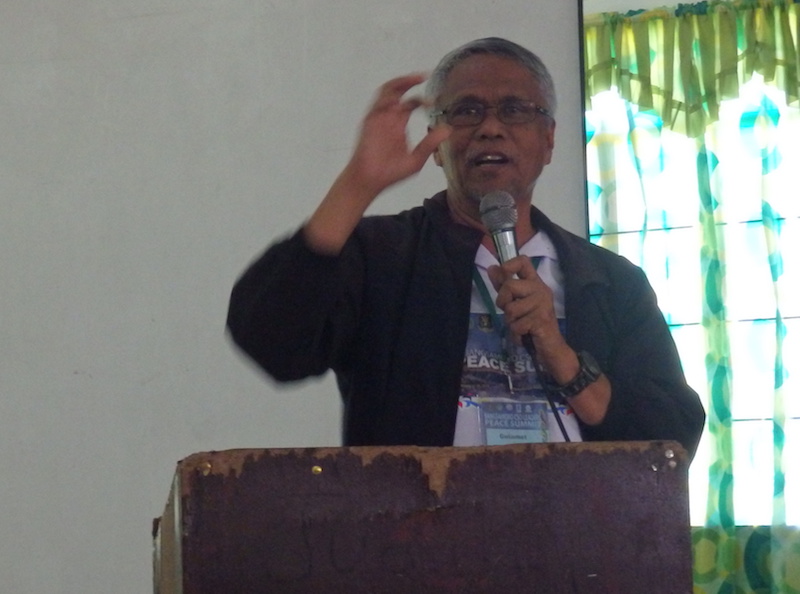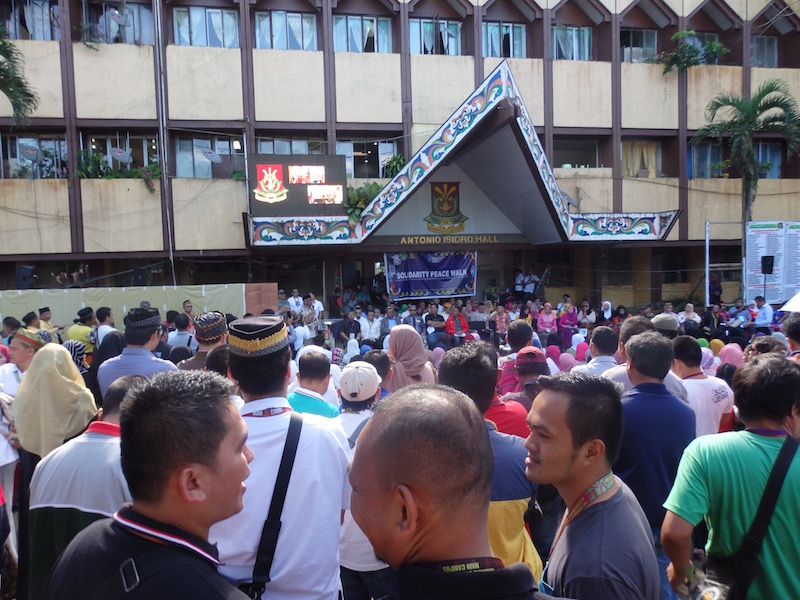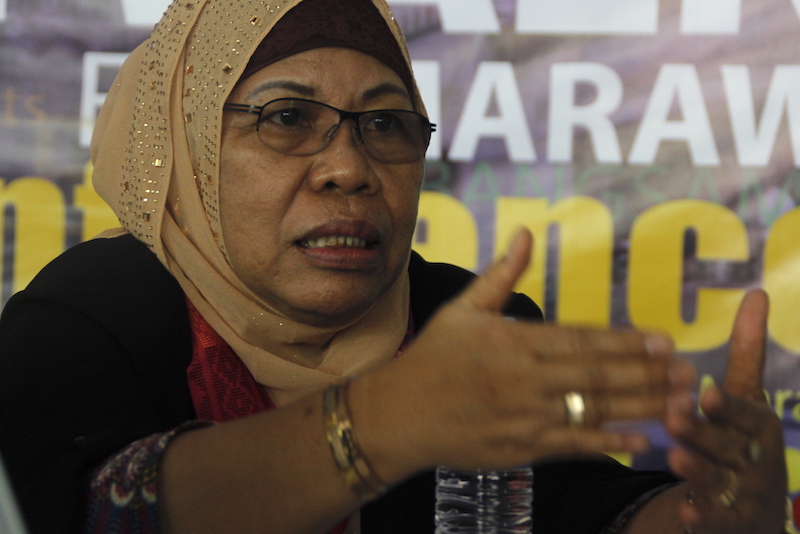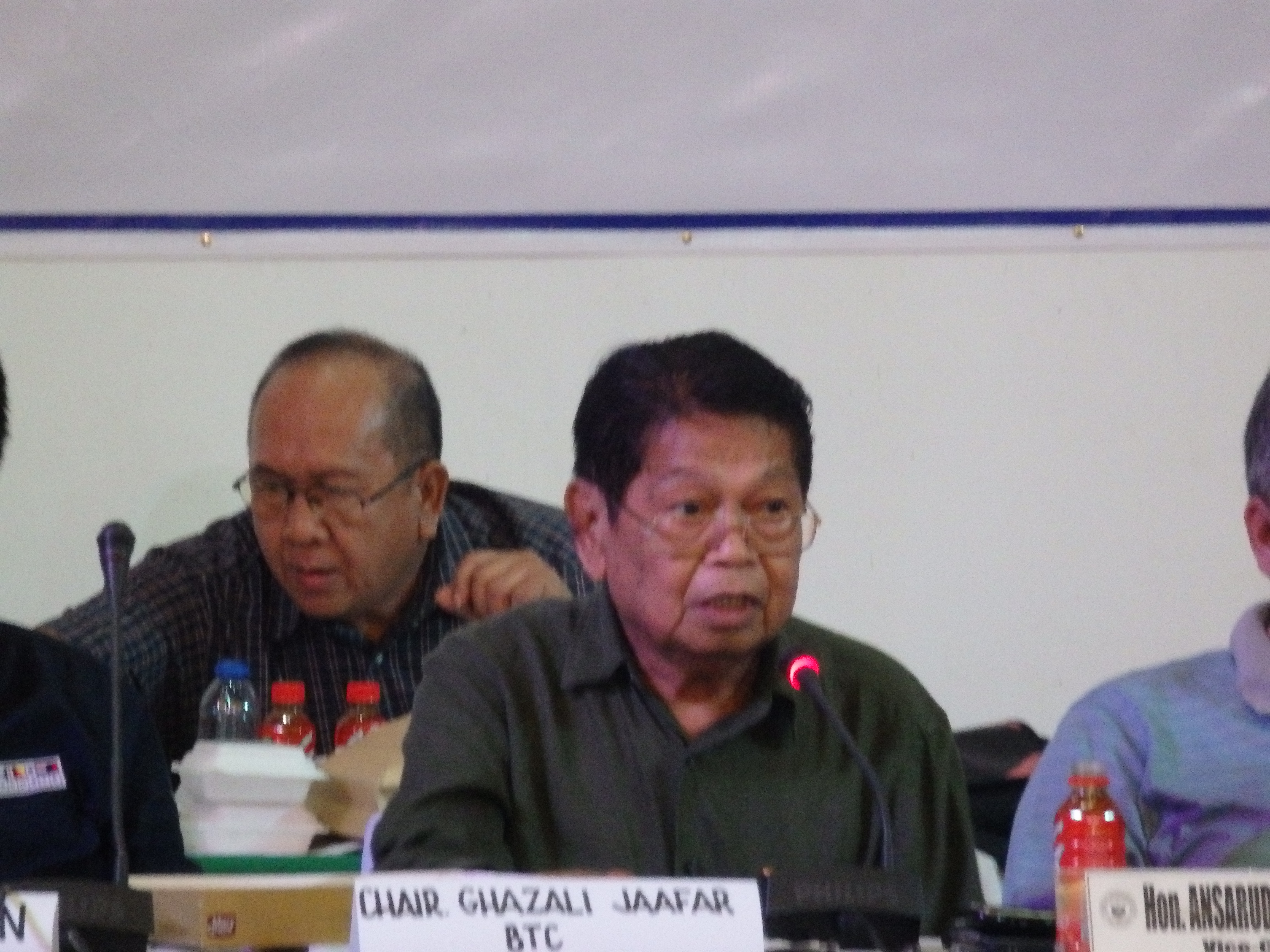MARAWI CITY (MindaNews / 22 Feb) — Leaders of Bangsamoro civil society organizations acknowledge the possibility of a “watered down” version of the Bangsamoro Basic Law (BBL) but hope the law that Congress assured will be passed later this month is “still acceptable” or they will oppose its ratification.
“I think people are saying it’s not going to be absolutely the BTC (Bangsamoro Transition Commission)-drafted BBL. It will be watered down. The most important thing we want to see is how much? So the bottomline is, yun bang pag water down is still acceptable in the sense that will it still work for the interest of the Bangsamoro?” asked Guiamel Alim, Executive Director of the Consortium of Bangsamoro Civil Society (CBCS).
“Any law that is not acceptable and will not redound to the benefit of the Bangsamoro should be opposed. Why should we allow a law that is not good for us? Alim told MindaNews.
“The most important thing is that we put up our position. Whether it will be watered down or not is no longer in our hands,” Alim said, but added that they will continue to appeal to Congress that the BTC-drafted BBL be passed as this was drafted by the Bangsamoro. “That’s the most important thing. This is for the Bangsamoro and residents of the Bangsamoro.”
 Guiamel Alim, Executive Director of the Consortium of Bangsamoro Civil Society delivers his closing remarks at the Bangsamoro CSO Leaders’ Peace Summit at the Mindanao State University in Marawi on 20 February 2018. MIndaNews photo by CAROLYN O. ARGUILLAS
Guiamel Alim, Executive Director of the Consortium of Bangsamoro Civil Society delivers his closing remarks at the Bangsamoro CSO Leaders’ Peace Summit at the Mindanao State University in Marawi on 20 February 2018. MIndaNews photo by CAROLYN O. ARGUILLAS
Alim and other leaders gathered here from Sunday to Tuesday for the Bangsamoro CSO Leaders’ Peace Summit where they pushed for the passage of the BTC-drafted Bangsamoro law and for national government to ensure Meranaws are consulted in the rehabilitation of Marawi.
The two houses of Congress had announced they would pass the BBL on third and final reading before Congress goes on break from March 24 to May 13.
The House of Representatives is consolidating four Bangsmaoro bills, including the version drafted by the 21-member Bangsamoro Transition Commission (BTC) while the Senate is also consolidating four bills, including the BTC version.
At the press conference that followed the Solidarity Peace Walk for Marawi last Monday, Alim said that “if civil society sees that it does not respond still to the needs (of the people) in the Bangsamoro then we might be inclined to oppose it.”
He said civil society organizations are doing their share in pushing Congress to pass the BTC-drafted version, through lobbying and conversations with members of Congress.
‘Not lower than ARMM’
The Moro Islamic Liberation Front (MILF) has repeatedly said that the Bangsamoro should “not be lower than the Autonomous Region in Muslim Mindanao” (ARMM) that it seeks to replace, and should comply with the Comprehensive Agreement on the Bangsamoro (CAB), the peace agreement that it signed with government on March 27, 2014.
President Rodrigo Duterte and members of Congress say the proposed law should not have provisions that raise constitutional questions. Former President Gloria Macapagal-Arroyo under whose administration the government and MILF initialled the Memorandum of Agreement on Ancestral Domain (MOA-AD) in late July 2008 but whose formal signing on August 5 was stopped by the Supreme Court a day earlier, told the public hearing in Cotabato City on February 15 that the law that they will pass should be one that will bring lasting peace and “papasa sa Supreme Court” (will pass the Supreme Court).
 Program at the entrance of the Administration Building at the Mindanao State University main campus in Marawi City after the Solidarity Peace Walk for Marawi on 19 February 2018. The peace walk was part of the activities of the Bangsamoro CSO Leaders’ Summit that started February 18 and ended on February 20. MindaNews photo by CAROLYN O. ARGUILLAS
Program at the entrance of the Administration Building at the Mindanao State University main campus in Marawi City after the Solidarity Peace Walk for Marawi on 19 February 2018. The peace walk was part of the activities of the Bangsamoro CSO Leaders’ Summit that started February 18 and ended on February 20. MindaNews photo by CAROLYN O. ARGUILLAS
“Yung BTC version, hanggang kaya, pero yung version na papasa sa Supreme Court” (We’ll work on the BTC version as much as possible, but it should be a version that will pass the Supreme Court).
Alim told MindaNews that among the non-negotiables that should be retained in the Bangsamoro law are the provisions on basic rights, territory – the six municipalities of Lanao del Norte and 39 barangays in North Cotabato that voted yes to inclusion in the ARMM in the 2001 plebiscite, and the whole of ARMM. The present ARMM comprises Basilan, Sulu, Tawi-tawi, Lanao del Sur and Maguindanao and the cities of Marawi and Lamitan. The CAB also provides that the cities of Cotabato and Isabela be part of the proposed Bangsamoro.
Alim told the press conference that the law must ensure the right to self-determination of the Bangsamoro, the issue of identity and Shariah.
Rufa Guiam, an anthropologist and retired professor told MindaNews the other non-negotiable is fiscal autonomy since there is no fiscal autonomy under the present ARMM.
“We can’t have real autonomy without fiscal autonomy. Otherwise we will still be kowtowing to Malacanang for everything,” she said.
 Prof. Rufa Cagoco-Guiam says the Bangsamoro law that will be passed by Congress should ensure fiscal autonomy, as she noted that there is no genuine autonomy without fiscal autonomy. MindaNews photo by H. MARCOS C. MORDENO
Prof. Rufa Cagoco-Guiam says the Bangsamoro law that will be passed by Congress should ensure fiscal autonomy, as she noted that there is no genuine autonomy without fiscal autonomy. MindaNews photo by H. MARCOS C. MORDENO
On the proposal of some lawmakers to include in the Bangsamoro law a ban on political dynasties, Alim said, “we want to see a national law first on anti-dynasty.”
He said the Bangsamoro parliament can pass a law on that but it will be good if the national government sets the example.
Guiam noted prejudice on the part of those pushing for an anti-dynasty provision “targeting only the ARMM but the dynasties exist everywhere, including Davao City.”
Acceptable to the people
Ghazali Jaafar, the MILF’s 1st Vice Chair and concurrent BTC chair, told MindaNews after the public hearing on the BBL in Cotabato City on February 15 that they expect a BBL that is “acceptable to the Bangsamoro people.”
“What kind of BBL will you not accept?” MindaNews asked. His reply: “If not acceptable to the Bangsamoro. Lower than ARMM (Autonomous Region in Muslim Mindanao). And watered down.”
 Ghazali Jaafar, 1st Vice Chair of the Moro Islamic Liberation Front and concurrent chair of the Bangsamoro Transition Commission at the public hearing on the Bangsamoro Basic Law in Cotbato City on1 15 February 2018. MindaNews photo by CAROLYN O. ARGUILLAS
Ghazali Jaafar, 1st Vice Chair of the Moro Islamic Liberation Front and concurrent chair of the Bangsamoro Transition Commission at the public hearing on the Bangsamoro Basic Law in Cotbato City on1 15 February 2018. MindaNews photo by CAROLYN O. ARGUILLAS
But Jaafar is optimistic the BTC draft will not be watered down. “The government will not give us BBL which is not complaint to the CAB,” he said, adding the President and Congress know “that the Bangsamoro people will not accept watered down BBL. And so they will try their best to give the Bangsamoro people BBL which is not watered down because all these people now, especially our President gusto niya tahimik na itong lugar natin” (wants our area to be peaceful).
“What if it’s a little bit more than ARMM but not in accordance with the CAB?” MindaNews asked.
Jaafar’s response: “Let the people decide,” but added, “I think they (Congress) will not give us BBL not compliant with the CAB.” (Carolyn O. Arguillas / MindaNews)
